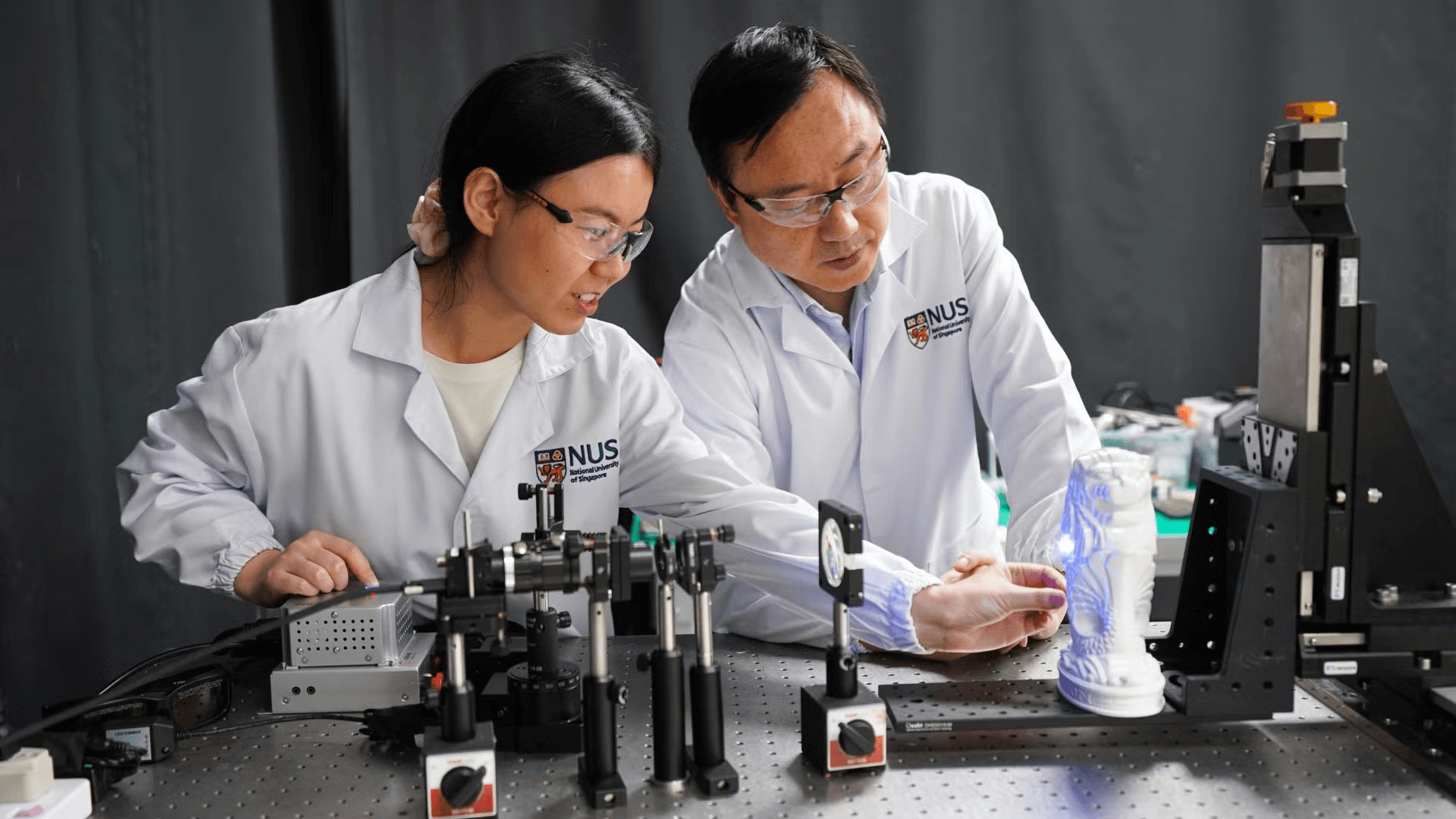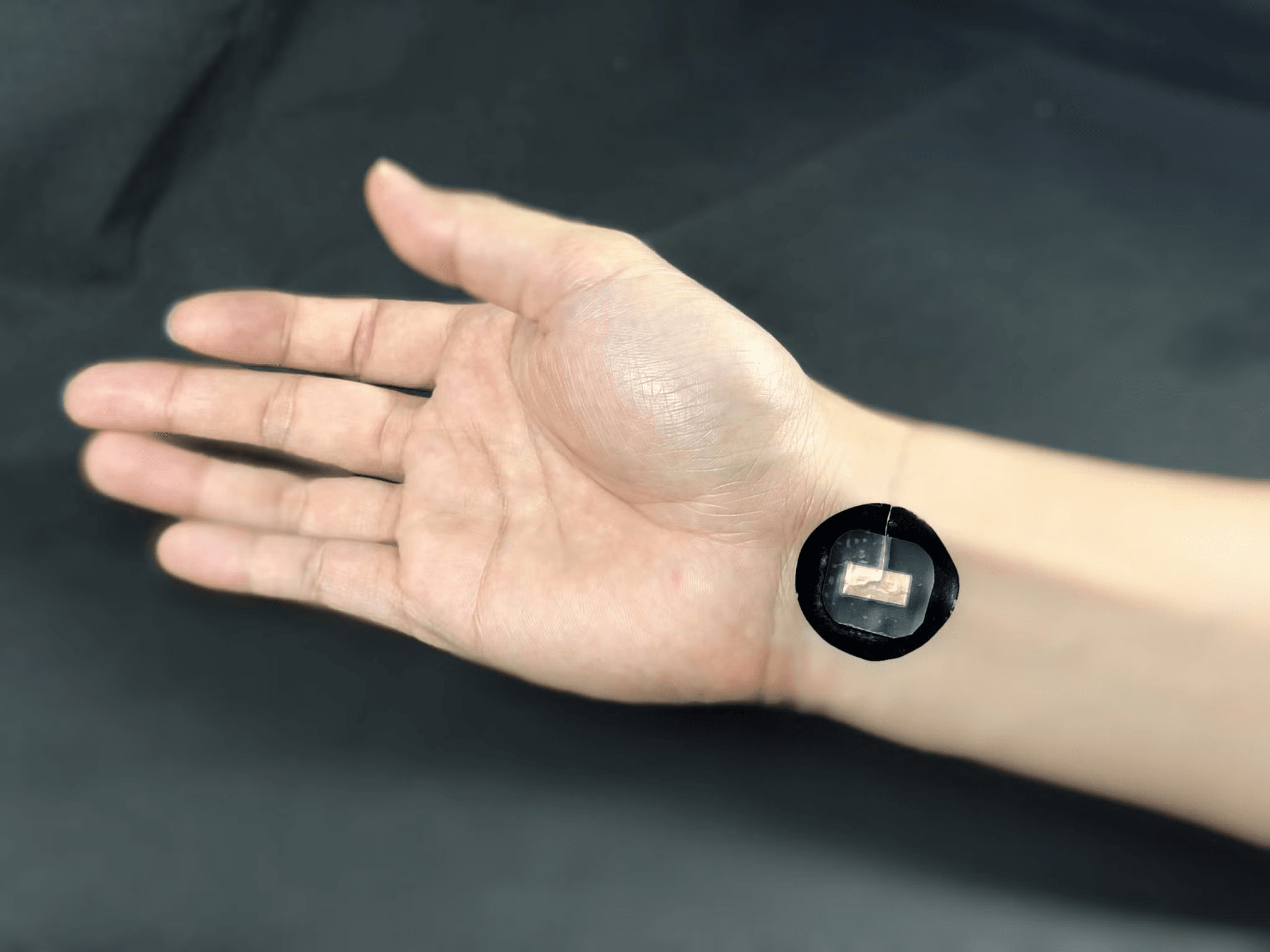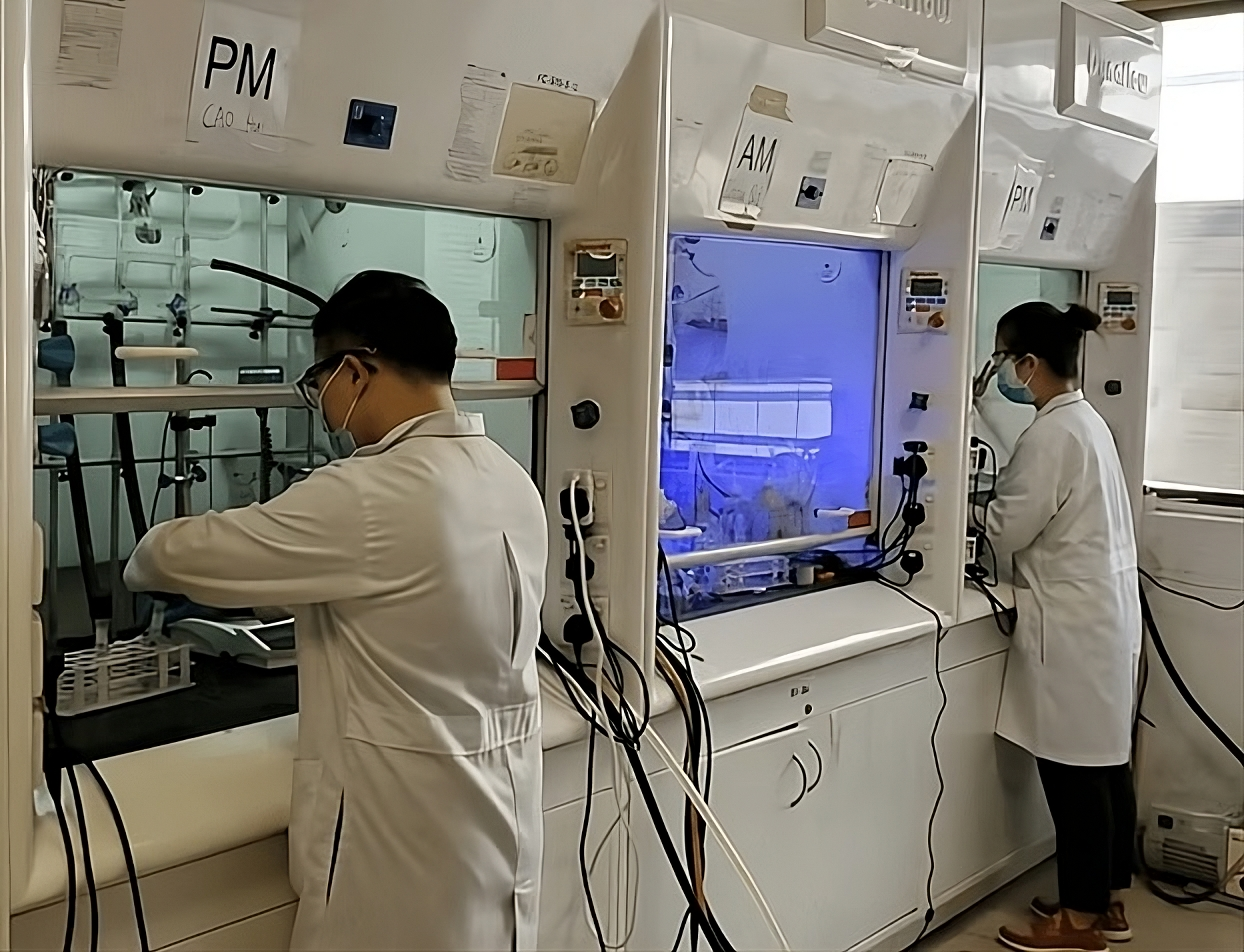World-leading research that
Shapes the Future
From Suzhou and Chongqing to Fuzhou and Guangzhou, each NUSRI China is home to problem-solvers, innovators and change-makers — conducting high-impact research across various domains to develop solutions to address some of today’s most pressing challenges.
NUSRI Suzhou
Biomedical and Health Technology
- Aligns with the Suzhou Industrial Park’s priority to develop biomedicine and healthcare as the leading industry. PIs from NUS Biomedical Engineering, Electrical and Computer Engineering and Food Science and Technology are brought together for collaborative and integrative R&D projects.
- Research fields include Biomaterials & Applications, Digital Medicine & Bioimaging, Health & Functional Food, Medical Robotics and Smart Medical Devices
Energy and Environmental Nanotech
- Aligns with the Suzhou Industrial Park’s focus on advancing nanotechnology applications. This platform leverages the expertise of PIs from NUS Chemistry, Materials Science and Engineering and Civil and Environmental Engineering to transform nanotechnology into industrial applications and solutions for real-world challenges.
- Research fields include Advanced Water Technology, Battery Materials & Devices, Characterisation of Nanomaterials, Nanocatalyst & Hydrogen Energy and Electronic Nanomaterials.
NUSRI Chongqing
Advanced Manufacturing and Materials
- Brings together interdisciplinary expertise from NUS to establish a comprehensive platform for high-performance materials research and advanced manufacturing solutions.
- Research areas include multifunctional CAD/CAM/Digital-Twin tools, digital platforms for product lifecycle management, high-fidelity process simulations and advanced structural and functional materials for diverse applications.
Intelligent Sensing and AI
- Focuses on developing practical smart city solutions by integrating advanced sensing technologies, artificial intelligence and data analytics. Collaborations aim to address urban challenges and advance industries like healthcare, agriculture and manufacturing.
- Research areas include spin and quantum sensing, RF sensing, embedded AI for visual sensing and multimodal data analytics for smart transportation.
Modern Logistics
- Specialises in operations research and analytics to tackle challenges in modern logistics, leveraging quantitative methods and real-time data to optimise supply chain and sustainability practices. This centre also develops tools, technologies and skilled talent to drive innovation in logistics.
- Research areas include strategic e-commerce supply chain analysis, supply chain risk analytics, last-mile operations and human behavior in operational processes.
Finance and Financial Risk Management
- Explores the intersection of modern finance with AI, data analytics and advanced quantitative methods, addressing the growing demand for data-driven insights in financial decision-making and risk management.
- Research areas include Fintech and Regtech applications, robo-advising and portfolio risk management, mobile payment technologies and digital transformation in finance.
Fuzhou RI
Flexible Electronics and Emerging Optoelectronics Centre
- Focuses on research in flexible electronics and emerging optoelectronics, leveraging organic semiconductors, 2D materials, quantum dots and functional nanomaterials to develop innovative technologies.
Advanced Manufacturing Centre
- Specialises in the research and development of advanced manufacturing processes and materials.
Energy Materials and Catalytic Centre
- Focuses on research in green and renewable energy technologies, energy storage systems and catalytic processes, addressing challenges in sustainability and environmental protection.
Centre for Fundamental and Frontier Physics
- Advances research in fundamental and frontier physics to expand scientific understanding and catalyse future technological breakthroughs
NUS GRTII
- Aligns with the needs of the China-Singapore Guangzhou Knowledge City and the Guangdong-Hong Kong-Macao Greater Bay Area, focusing on the research areas of: Smart City, Information and Communication, Electronic Science and Technology, Advanced Manufacturing, Artificial Intelligence, Biological Sciences and Financial Technology.
- Six key laboratories have been established: Smart City Laboratory, 3D Printing Laboratory, International Joint Laboratory of Humanoid Robots, International Joint Laboratory of Sustainable Smart 3D Materials, Smart Healthcare Laboratory and Artificial Intelligence Laboratory

NUS (Suzhou) Research Institute
Biomedical and Health Technology
- Research fields include Biomaterials and Applications, Digital Medicine and Bioimaging, Health and Functional Food, Medical Robotics, and Smart Medical Devices.
- PIs from NUS Biomedical Engineering, Electrical and Computer Engineering and Food Science and Technology are brought together for collaborative and integrative R&D projects.
- Aligns with Suzhou Industrial Park’s priority to develop biomedicine and healthcare as the leading industry.
Energy and Environmental Nanotech
- Research fields include Advanced Water Technology, Battery Materials and Devices, Characterisation of Nanomaterials, Nanocatalyst and Hydrogen Energy, and Electronic Nanomaterials.
- Leverages the expertise of PIs from NUS Chemistry, Materials Science and Engineering and Civil and Environmental Engineering to transform nanotechnology into industrial applications and solutions for real-world challenges.
- Aligns with Suzhou Industrial Park’s focus on advancing nanotechnology applications.
Biomedical and Health Technology
- Research fields include Biomaterials and Applications, Digital Medicine and Bioimaging, Health and Functional Food, Medical Robotics, and Smart Medical Devices.
- PIs from NUS Biomedical Engineering, Electrical and Computer Engineering and Food Science and Technology are brought together for collaborative and integrative R&D projects.
- Aligns with Suzhou Industrial Park’s priority to develop biomedicine and healthcare as the leading industry.
Energy and Environmental Nanotech
- Research fields include Advanced Water Technology, Battery Materials and Devices, Characterisation of Nanomaterials, Nanocatalyst and Hydrogen Energy, and Electronic Nanomaterials.
- Leverages the expertise of PIs from NUS Chemistry, Materials Science and Engineering and Civil and Environmental Engineering to transform nanotechnology into industrial applications and solutions for real-world challenges.
- Aligns with Suzhou Industrial Park’s focus on advancing nanotechnology applications.

NUS (Chongqing) Research Institute
Advanced Manufacturing and Materials
- Research areas include multifunctional CAD/CAM/Digital-Twin tools, digital platforms for product lifecycle management, high-fidelity process simulations and advanced structural and functional materials for diverse applications.
- Brings together interdisciplinary expertise from NUS to establish a comprehensive platform for high-performance materials research and advanced manufacturing solutions.
Intelligent Sensing and AI
- Research areas include spin and quantum sensing, RF sensing, embedded AI for visual sensing and multimodal data analytics for smart transportation.
- Focuses on developing practical smart city solutions by integrating advanced sensing technologies, artificial intelligence and data analytics. Collaborations aim to address urban challenges and advance industries like healthcare, agriculture and manufacturing.
Modern Logistics
- Research areas include strategic e-commerce supply chain analysis, supply chain risk analytics, last-mile operations and human behavior in operational processes.
- Specialises in operations research and analytics to tackle challenges in modern logistics, leveraging quantitative methods and real-time data to optimise supply chain and sustainability practices.
Finance and Financial Risk Management
- Research areas include Fintech and Regtech applications, robo-advising and portfolio risk management, mobile payment technologies and digital transformation in finance.
- Explores the intersection of modern finance with AI, data analytics and advanced quantitative methods, addressing the growing demand for data-driven insights in financial decision-making and risk management.

NUS Guangzhou Research Translation and Innovation Institute
Key Research Areas
- Smart City, Information and Communication, Electronic Science and Technology, Advanced Manufacturing, Artificial Intelligence Applications, Biological Sciences and Financial Technology.
Biomedical and Intelligent Healthcare Innovation
- Research focuses on intelligent healthcare and medical robotics, leveraging advanced digital technology for healthcare advancements.
- PIs from NUS Biomedical Engineering and Saw Swee Hock School of Public Health collaborate with local hospitals and enterprises on translational research to address regional healthcare challenges.
- Key initiatives: rehabilitation robotics and digital health platforms for the community, medical imaging analysis, and surgical robotics.
Artificial Intelligence Applications and Smart City
- Research focuses on AI-driven systems and platforms, humanoid robotics, and smart transportation to enhance urban living through technology.
- Leverages the expertise of PIs from NUS College of Design and Engineering and School of Computing to lead projects integrating AI with real-world applications.
- Key initiatives: AI-assisted reproductive technology, humanoid robots, and exoskeleton robots for industrial applications.

Tianjin University–National University of Singapore Joint Institute in Fuzhou
Flexible Electronics and Emerging Optoelectronics Centre
- Focuses on research in flexible electronics and emerging optoelectronics, leveraging organic semiconductors, 2D materials, quantum dots and functional nanomaterials to develop innovative technologies.
Advanced Manufacturing Centre
- Specialises in the research and development of advanced manufacturing processes and materials.
Energy Materials and Catalytic Centre
- Focuses on research in green and renewable energy technologies, energy storage systems and catalytic processes, addressing challenges in sustainability and environmental protection.
Centre for Fundamental and Frontier Physics
- Advances research in fundamental and frontier physics to expand scientific understanding and catalyse future technological breakthroughs.

NUS (Suzhou) Research Institute
Biomedical and Health Technology
- Research fields include Biomaterials and Applications, Digital Medicine and Bioimaging, Health and Functional Food, Medical Robotics, and Smart Medical Devices.
- PIs from NUS Biomedical Engineering, Electrical and Computer Engineering and Food Science and Technology are brought together for collaborative and integrative R&D projects.
- Aligns with Suzhou Industrial Park’s priority to develop biomedicine and healthcare as the leading industry.
Energy and Environmental Nanotech
- Research fields include Advanced Water Technology, Battery Materials and Devices, Characterisation of Nanomaterials, Nanocatalyst and Hydrogen Energy, and Electronic Nanomaterials.
- Leverages the expertise of PIs from NUS Chemistry, Materials Science and Engineering and Civil and Environmental Engineering to transform nanotechnology into industrial applications and solutions for real-world challenges.
- Aligns with Suzhou Industrial Park’s focus on advancing nanotechnology applications.

NUS Guangzhou Research Translation and Innovation Institute
Key Research Areas
- Smart City, Information and Communication, Electronic Science and Technology, Advanced Manufacturing, Artificial Intelligence Applications, Biological Sciences and Financial Technology.
Biomedical and Intelligent Healthcare Innovation
- Research focuses on intelligent healthcare and medical robotics, leveraging advanced digital technology for healthcare advancements.
- PIs from NUS Biomedical Engineering and Saw Swee Hock School of Public Health collaborate with local hospitals and enterprises on translational research to address regional healthcare challenges.
- Key initiatives: rehabilitation robotics and digital health platforms for the community, medical imaging analysis, and surgical robotics.
Artificial Intelligence Applications and Smart City
- Research focuses on AI-driven systems and platforms, humanoid robotics, and smart transportation to enhance urban living through technology.
- Leverages the expertise of PIs from NUS College of Design and Engineering and School of Computing to lead projects integrating AI with real-world applications.
- Key initiatives: AI-assisted reproductive technology, humanoid robots, and exoskeleton robots for industrial applications.

NUS (Chongqing) Research Institute
Advanced Manufacturing and Materials
- Research areas include multifunctional CAD/CAM/Digital-Twin tools, digital platforms for product lifecycle management, high-fidelity process simulations and advanced structural and functional materials for diverse applications.
- Brings together interdisciplinary expertise from NUS to establish a comprehensive platform for high-performance materials research and advanced manufacturing solutions.
Intelligent Sensing and AI
- Research areas include spin and quantum sensing, RF sensing, embedded AI for visual sensing and multimodal data analytics for smart transportation.
- Focuses on developing practical smart city solutions by integrating advanced sensing technologies, artificial intelligence and data analytics. Collaborations aim to address urban challenges and advance industries like healthcare, agriculture and manufacturing.
Modern Logistics
- Research areas include strategic e-commerce supply chain analysis, supply chain risk analytics, last-mile operations and human behavior in operational processes.
- Specialises in operations research and analytics to tackle challenges in modern logistics, leveraging quantitative methods and real-time data to optimise supply chain and sustainability practices.
Finance and Financial Risk Management
- Research areas include Fintech and Regtech applications, robo-advising and portfolio risk management, mobile payment technologies and digital transformation in finance.
- Explores the intersection of modern finance with AI, data analytics and advanced quantitative methods, addressing the growing demand for data-driven insights in financial decision-making and risk management.

Tianjin University–National University of Singapore Joint Institute in Fuzhou
Flexible Electronics and Emerging Optoelectronics Centre
- Focuses on research in flexible electronics and emerging optoelectronics, leveraging organic semiconductors, 2D materials, quantum dots and functional nanomaterials to develop innovative technologies.
Advanced Manufacturing Centre
- Specialises in the research and development of advanced manufacturing processes and materials.
Energy Materials and Catalytic Centre
- Focuses on research in green and renewable energy technologies, energy storage systems and catalytic processes, addressing challenges in sustainability and environmental protection.
Centre for Fundamental and Frontier Physics
- Advances research in fundamental and frontier physics to expand scientific understanding and catalyse future technological breakthroughs.
NUS (Suzhou) Research Institute
+ Biomedical and Health Technology
- Research fields include Biomaterials and Applications, Digital Medicine and Bioimaging, Health and Functional Food, Medical Robotics, and Smart Medical Devices.
- PIs from NUS Biomedical Engineering, Electrical and Computer Engineering and Food Science and Technology are brought together for collaborative and integrative R&D projects.
- Aligns with Suzhou Industrial Park’s priority to develop biomedicine and healthcare as the leading industry.
+ Energy and Environmental Nanotech
- Research fields include Advanced Water Technology, Battery Materials and Devices, Characterisation of Nanomaterials, Nanocatalyst and Hydrogen Energy, and Electronic Nanomaterials.
- Leverages the expertise of PIs from NUS Chemistry, Materials Science and Engineering and Civil and Environmental Engineering to transform nanotechnology into industrial applications and solutions for real-world challenges.
- Aligns with Suzhou Industrial Park’s focus on advancing nanotechnology applications.
NUS (Chongqing) Research Institute
+ Advanced Manufacturing and Materials
- Research areas include multifunctional CAD/CAM/Digital-Twin tools, digital platforms for product lifecycle management, high-fidelity process simulations and advanced structural and functional materials for diverse applications.
- Brings together interdisciplinary expertise from NUS to establish a comprehensive platform for high-performance materials research and advanced manufacturing solutions.
+ Intelligent Sensing and AI
- Research areas include spin and quantum sensing, RF sensing, embedded AI for visual sensing and multimodal data analytics for smart transportation.
- Focuses on developing practical smart city solutions by integrating advanced sensing technologies, artificial intelligence and data analytics. Collaborations aim to address urban challenges and advance industries like healthcare, agriculture and manufacturing.
+ Modern Logistics
- Research areas include strategic e-commerce supply chain analysis, supply chain risk analytics, last-mile operations and human behavior in operational processes.
- Specialises in operations research and analytics to tackle challenges in modern logistics, leveraging quantitative methods and real-time data to optimise supply chain and sustainability practices.
+ Finance and Financial Risk Management
- Research areas include Fintech and Regtech applications, robo-advising and portfolio risk management, mobile payment technologies and digital transformation in finance.
- Explores the intersection of modern finance with AI, data analytics and advanced quantitative methods, addressing the growing demand for data-driven insights in financial decision-making and risk management.
Tianjin University–National University of Singapore Joint Institute in Fuzhou
+ Flexible Electronics and Emerging Optoelectronics Centre
- Focuses on research in flexible electronics and emerging optoelectronics, leveraging organic semiconductors, 2D materials, quantum dots and functional nanomaterials to develop innovative technologies.
+ Advanced Manufacturing Centre
- Specialises in the research and development of advanced manufacturing processes and materials.
+ Energy Materials and Catalytic Centre
- Focuses on research in green and renewable energy technologies, energy storage systems and catalytic processes, addressing challenges in sustainability and environmental protection.
+ Centre for Fundamental and Frontier Physics
- Advances research in fundamental and frontier physics to expand scientific understanding and catalyse future technological breakthroughs.
NUS Guangzhou Research Translation and Innovation Institute
+ Key Research Areas
- Smart City, Information and Communication, Electronic Science and Technology, Advanced Manufacturing, Artificial Intelligence Applications, Biological Sciences and Financial Technology.
+ Biomedical and Intelligent Healthcare Innovation
- Research focuses on intelligent healthcare and medical robotics, leveraging advanced digital technology for healthcare advancements.
- PIs from NUS Biomedical Engineering and Saw Swee Hock School of Public Health collaborate with local hospitals and enterprises on translational research to address regional healthcare challenges.
- Key initiatives: rehabilitation robotics and digital health platforms for the community, medical imaging analysis, and surgical robotics.
+ Artificial Intelligence Applications and Smart City
- Research focuses AI-driven systems and platforms, humanoid robotics, and smart transportation to enhance urban living through technology.
- Leverages the expertise of PIs from NUS College of Design and Engineering and School of Computing to lead projects integrating AI with real-world applications.
- Key initiatives: AI-assisted reproductive technology, humanoid robots, and exoskeleton robots for industrial applications.
Aligns with NUS’ Research Capabilities
Research at NUSRI China is driven by regional needs across China and is supported by the NUS’ research capabilities under eight integrative research clusters:
By bridging these clusters with targeted research efforts, NUSRI China is uniquely positioned to contribute to advancements in these critical fields on both a regional and global scale.
Our Research Impact
264
patents
filed
3,495
academic papers published
in quality journals
272
Successful grant
applications
*All figures are cumulative as of December 2024
Aligns with NUS’ Research Capabilities
Research at NUSRI China is driven by regional needs across China and is supported by the NUS’ research capabilities under eight integrative research clusters:
By bridging these clusters with targeted research efforts, NUSRI China is uniquely positioned to contribute to advancements in these critical fields on both a regional and global scale.
Our Research Impact
264
patents
filed
3,495
academic papers published
in quality journals
272
Successful grant
applications
*All figures are cumulative as of December 2024
Discover More Research Highlights
Redefining Reality: Perovskite Nanocrystals Enable High-Resolution 3D Imaging
NUSRI Suzhou’s novel 3D imaging sensor offers unprecedented clarity and...
New Durable Electrodes Advance Physiotherapy
A newly discovered flexible organic polymer opens the way to...
Late-Stage Functionalisation of Carbon-Hydrogen Bonds
Method to potentially find broad application in olefin synthesis, structural...



